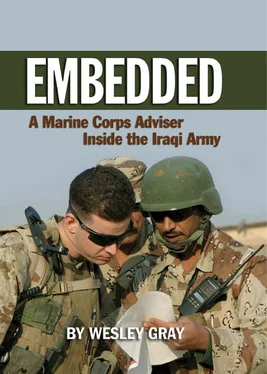I wished V and Hussein safe travels and bid them farewell. As I exited the rear of the helicopter, Hussein looked at his dead cousin. He was disgusted, shaking his head in sorrow. “Jamal,” he said, “last month my only brother was killed in a suicide car bomb attack in Al Qaim. I cannot deal with more death in my country.” I tried to console him. “Hussein, Allah wiyak wa ahelek. Rah ykoon maku mushkila bil mustekbel.” (Hussein, God is with you and your family. There will be no problems in the future.) I paused, shook his hand with a firm grip, and said, “Insha’allah.”
I felt extremely sorry for Hussein. The state of life in Iraq is treacherous. It is almost standard operating procedure that Iraqis bury a loved one every month in this country. Meanwhile, in America we are worried about unemployment rising from 4.5 percent to 5.5 percent. Who cares? Imagine if the tables were turned and we had to worry if we had four and a half days or five and a half days to live. The Iraqi people are faced with challenges that dwarf the typical American sob story.
Chapter 12
The Iraqi Officer and Enlisted Relationship
October–November 2006
On the return trip from Haqliniyah, Maj. Travis Gaines and I stopped a bit short of Camp Ali along South Dam Road. Gaines turned to me and said, “Jamal, do you know why the Iraqis decided to stop”—he raised his voice—“in the middle of the road?” I replied, “Sir, I have no clue.”
Thirty seconds after we had stopped, Sermen, an Iraqi soldier, came jogging past our Humvee and approached the rear Iraqi Humvee. At the same time Ayad sprinted past the side of our Humvee and headed to the Iraqi Humvee in the front of the convoy. Gaines said over the radio, “Does anyone have a clue why the hell Sermen is coming to the rear of the convoy and Ayad is moving to the front of the convoy while we’re still outside the wire?” The radio was silent. Nobody on the MiTT knew what was happening.
I found out what had transpired once we arrived at the camp. According to the Iraqis there was a huge fight between Sermen and Captain Natham, the Iraqi convoy commander. Captain Natham had requested that Sermen refrain from driving like a maniac and slow his Humvee. Sermen had refused the order, told Natham to go to hell, jumped out of the Humvee, and gone to the rear of the convoy because he could not stand Natham any longer.
After hearing the story I did not know whose side to take. On the one hand Captain Natham was the convoy commander and had the authority to tell his subordinates what they could and could not do. On the other hand Sermen realized that if he drove as Natham desired, the convoy would become an easy target for insurgents. I decided I was with Sermen. Speed and unpredictability keep you alive in Iraq. Even so, because Sermen was in the military, he needed to respect his officer’s commands.
This incident highlights the relationship between officers and enlisted men in the Iraqi army. In the U.S. Marines, if an enlisted Marine defies an officer or senior enlisted, he isn’t allowed to carry on as if nothing happened. He is punished through the Uniform Code of Military Justice. Without respect for the chain of command, a military organization will have no ability to maintain order and discipline.
Sadly, the Iraqi army is set up so that soldiers have no service obligation and face no legal punishments. If a jundi decides the Iraqi army sucks and wants to quit, he can. Likewise, if he wants to tell a superior officer to rot in hell, he can. In the Iraqi army it is nearly impossible for officers to maintain military rule that is necessary to execute combat operations. A formal legal system simply does not exist. The only way for officers to punish the jundi is to take away pay or leave, but when they implement this punishment, the jundi just quit.
There is another side to the Iraqi officer and enlisted relationship, of course. The Iraqi officers treat the soldiers like servants. It is very difficult for enlisted soldiers to take orders from their officers if they believe the officers do not care about them. Here is a perfect example. One day we were rolling through the Haditha market and spotted a vehicle that looked like one of the vehicles on our BOLO (be on the lookout) list. Our Humvee immediately flagged the vehicle to pull over, then we called up the rear Iraqi Humvee to go search the car.
After five minutes the Iraqi Humvee finally pulled up. We waited for another five minutes and began to wonder why nobody was searching the car. We asked our terp Mark to call them on the Iraqi radio net to find out what the situation was. Mark explained, “Gents, the Humvee alongside us is full of Iraqi officers and they are refusing to do “soldier” tasks. They see their role as commanders and thus do not have a role in actually conducting any of the work.” Major Gaines and I each looked at each other, dumbfounded. Gaines replied, “Mark, are you kidding me or are you serious?” Mark replied, “I’m not joking, Gaines. The Iraqi officers just called on some enlisted soldiers from one of the front Humvees to come back and search the vehicle.” Confused, I said, “Mark, the officers are twenty feet from the car. The soldiers they called on are two football fields away. I don’t get it.” Mark smirked and said, “I know. It’s stupid. Welcome to Iraq.”
I guess none of this was surprising. The concept of king and servant seems to be pervasive in Iraqi culture. The sad part is that we are supposed to change these people somehow. In the words of one of our Camp Taji instructors, “Teach the Iraqis the concept of the leader being the servant of his men. Teach the Iraqi officers that they must respect their enlisted soldiers.” Are you kidding me? That’s equivalent to asking us to convince the American people that they need to stop watching NFL football and start watching professional soccer. Changing a culture is not a mission, it’s a pipe dream.
Major Pyle and I spoke to Lieutenant Colonel Ali about promoting Sergeant Major Kasem to the highest position of enlisted leadership in the battalion. We suggested that he replace Sergeant Major Nayim, who maintained the current position and had failed miserably in his role. Major Pyle stated the facts. “Seyidi [Sir], Kasem is a stellar leader, has impressive initiative, and gets things done on camp. We believe Kasem should be in the highest enlisted position. He can have a positive influence on the entire battalion, show off his work ethic, and reinforce the concept that meritocracy wins over nepotism.”
Lieutenant Colonel Ali was visibly confused. He gave Pyle an odd look. “Why would I promote Kasem? If we promote Kasem we have to get someone else to fill his current job and he is doing a great job where he is. If I move him to Nayim’s position, he has to learn another job. It makes absolutely no sense. And if I give him a promotion, all of the jundi will want promotions. Finally, if Nayim gets kicked out of the top enlisted position, he will lose all respect in the battalion. I will not do this. Nayim is my friend.” Major Pyle’s jaw dropped to the ground—and for good reason. How can a Marine respond sensibly to something like this?
Sometimes the Iraqis just don’t get it. Their deep-seated tribal influences reinforce some of their least productive traits: maintaining the status quo, nepotism, playing favorites, and fixating on pride and honor. The concept that the hardest-working, most-qualified individuals should be rewarded for their efforts is completely foreign to them.
Читать дальше












